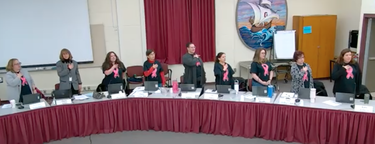Board rallies for VP, votes on tax breaks, hears about reserves and capital project
GUILDERLAND — All eight of the school board members present at their Jan.14 meeting wore black T-shirts, each with a prominent pink ribbon front and center.
The board’s vice president, Kelly Person, was absent.
Person was “diagnosed with breast cancer just before the holidays and is on the path to recovery” the board’s president, Blanca Gonzalez-Parker, told The Enterprise when asked about the pink ribbons.
She said the board members will be wearing the T-shirts and pins “moving forward to show our support for Kelly and help raise awareness. If seeing one of our pink ribbons encourages or reminds even one person to schedule their mammogram or do a self-exam, then that is, in my opinion, a beautiful way to honor our sister board member and all other breast cancer fighters and champions.”
While the board’s solidarity for Person was clear, the board had a rare split vote on granting tax exemptions for low-income elderly and disabled residents.
The board also heard a presentation about the district’s reserves and updates on a capital project and reaction to a potential smartphone ban.
Tax breaks
The state legislature has amended the Real Property Tax Law to allow school districts and municipalities to raise the income ceiling for exemptions.
Last October, the town of Guilderland went to the maximum for senior citizens and the next month did the same for residents with disabilities.
Town taxes make up roughly 12 percent of Guilderland property taxes while the school taxes are the lion’s share.
Albany County offered the same exemptions, at the ceiling maximum, over a year ago.
The Guilderland school district had offered both exemptions — for low-income seniors and for low-income people with disabilities — at what had been the previous ceiling: an income of $29,000 for a 50-percent exemption.
The new maximum allowed by the state is $50,000 for a 50-percent exemption. The percentage of the exemption decreases as the income increases so that someone with an annual income of $58,400 would get a 5-percent exemption.
The school board’s Business Practices Committee put forth a proposal that the ceiling be raised from the current $29,000 to $35,000 rather than to the allowed $50,000.
Board member Meredith Brière, who serves on the Business Practices Committee, explained her reasoning to the board at its December meeting for suggesting the $35,000 ceiling in the first place.
“We have a high level [of residents] below the poverty line in this district …,” she said. “We have a high number of renters and we have to remember, when giving exemptions, those tax implications end up on the entire population including renters because rents will go up.”
Bringing the ceiling up to $50,000, she said, “just seemed really high” while at the same time $29,000 “is really a difficult number to live on.” She went on, “So we came to a compromise of $35,000.”
At the other end of the sliding scale, with this compromise, someone with an annual income of $43,399 would get a 5-percent break.
To make up the difference for an exemption, other property owners in town would pay more.
On Jan. 14, board member Rebecca Butterfield asked Assistant Superintendent for Business Andrew Van Alstyne for a rough estimate of how much more other taxpayers would be paying for the exemption.
Van Alstyne replied that for the exemption the board granted last year for volunteer firefighters in town the typical house would pay dollars more. “This would probably be measured in tens of dollars if we did the full amount,” he said.
Ultimately, the board twice voted, 6 to 2, to raise the ceiling to $35,000 for both seniors and for people with disabilities, with Butterfield and Gonzalez-Parker opposed.
“The reason I’m opposed to this … is because the tax burden then goes to other taxpayers ….,’ said Butterfield, “which would include low-income families who are not senior citizens or people with disabilities.”
The new ceiling will be in place for taxes levied this year, Van Alstyne said; to receive the exemption, residents have to apply by March 1.
To qualify for the exemption, seniors generally must be 65 years of age or older and a disabled person must have a physical or mental impairment — not due to current use of alcohol or illegal drugs — that limits their ability to care for themselves, or to perform manual tasks, walk, see, hear, speak, breathe, learn, or work.
Savings
At the board’s December meeting, Van Alstyne had described what a rollover budget — keeping the same staffing and programs as this year — would look like for next year.
Next year’s budget is projected at $130 million, an increase of 4 percent over this year, leaving a $3.1 million gap between projected revenue and projected expenses for next year.
Superintendent Marie Wiles is slated to present a draft budget on March 4, and voters will have their say on May 20.
At the Jan. 14 meeting, Van Alstyne went over the district’s savings, including both its fund balance and its reserves.
The unassigned fund balance, or rainy-day account, is limited to 4 percent of the following year’s budget.
Reserves are money that the district is allowed, by the state, to save for particular needs. For example, Guilderland currently has about $3 million in a capital reserve and about $8 million in reserve for retirement contributions.
Van Alstyne displayed a chart showing the effect the Great Recession, from 2007 to 2009, had on Guilderland’s savings, which steadily declined from $11.4 million in 2007 to $5.8 million in 2014, leading to a designation from the state comptroller of the district being “susceptible to fiscal stress.”
This resulted in a lower bond rating — which has since been rectified — and therefore higher borrowing costs at the time.
“We have not been ‘susceptible to stress’ for many years so that’s a good sign, said Van Alstyne.
He also displayed a graph showing what share of Guilderland’s budget is made up of savings, which shows a divergence from its peer districts in the Suburban Council.
During the last school year, Guilderland dipped to about 10 percent as opposed to the roughly 17 percent of its peers.
This was due to the many tax certiorari cases faced by the district as a result of town-set assessment rates.
The school district’s refunds to Guilderland property owners, mostly large businesses, issued from the 2021-22 school year to 2023-24 totaled $9.6 million. With its reserve drained, Guilderland took out a bond to pay back the difference.
For this school year, Guilderland has close to 15 percent, heading towards the nearly 18-percent norm of its Suburban Council peers.
Although Guilderland is currently facing more tax certiorari claims, Van Alstyne said that the good news is those claims are much smaller than the original wave.
As the district anxiously awaits state legislative decisions on the future of Foundation Aid along with uncertainty about federal aid, Van Alstyne said that “having fund balance and reserves are a vital fiscal tool.”
Capital project
“We are hard at work defining the scope of the capital project that will go before the voters on May 20, 2025,” Wiles told the board.
A facilities committee is working through the recommendations made by the Future-Ready Task Force as well as reviewing items generated through a survey of building conditions while also looking at items that were not included in the last capital project.
Additionally, new requirements have to be met, such as preparing for the state-mandated electric buses.
“We cannot do all of it,” said Wiles, “because the scope of the work would just be more than would be wise to ask our community to support.”
Before the board’s next meeting, on Feb. 11, consensus needs to be reached on what to include in the project.
“Right now,” said Wiles, “internally, the facilities committee is working on a ThoughtExchange because we want to make sure all of their voices are heard as we’re deliberating,” she said of an online survey.
Smartphone ban
As the district considers banning smartphones at school, various groups were surveyed for their thoughts on the subject.
Wiles said 111 staff members completed a ThoughtExchange survey and were the “most enthusiastic about looking at creating distraction-free school zones.”
The staff’s number-one thought was to follow the lead of local districts that have successfully implemented a ban while the second most popular thought was “students’ well-being needs to be our top priority.”
The response from families was “more of a mixed bag,” Wiles said. The top thought was to allow everyone to weigh in.
Another highly rated comment from families was, “Banning cell phones in schools doesn’t stop the bullying that happens on them outside of school."
Only 38 percent of Guilderland High School students participated in a survey.
Of those, 34 percent said cell phones are not a distraction, 28 percent were neutral, and 38 percent said they were a distraction
The majority, 59 percent, said cell phones have no impact on academic performance while 24 percent said neither yes nor no, and 17 percent said there is an impact.
“However, the research shows quite the opposite,” said Wiles, indicating that cell-phone use in school leads to lower-quality notes, less retained information, and poor performance on tests.
Among the benefits listed by students were: Cell phones give them a break from academic pressures, let them connect with friends, and help them stay updated on events.
Wiles concluded, “The other big topic that came up … this was from both students and parents, was cell phones being important tools to communicate in an emergency.”
Other business
In other business at its Jan. 14 meeting, the Guilderland School Board:
— Heard a request, accompanied by a petition signed by nearly 230 Guilderland High School students, from two Hindu students to make Diwali a school holiday; see related editorial;
— Heard from David Dwyer ideas for students to explore career opportunities, such as through internships and job shadowing. Wiles said she would meet with Dwyer and then share his ideas with the board;
— Accepted the resignation, for retirement, of Christopher Sanita, long-time principal of Pine Bush Elementary School, and applauded his work. “You’re an amazing principal. It’s been an honor to work with you,” said Kim Blasiak, one of several board members who praised Sanita.
Sanita, in turn, thanked the board, his colleagues, his students, and their families. “I certainly reflect with a debt of gratitude and appreciation for just the opportunity to work in this special place,” he said; and
— Heard that the board’s Communication Committee is discussing changing the criteria for the board’s annual awards for high school students so that the award would no longer be based on grades but rather be based on staff nominations for “students who are making significant positive contributions to the school environment," said Katie DiPierro, who serves on the committee.
She said these would be students who often aren’t recognized.
“How is that different than the Deserving Dutchman?” asks Gonzalez-Parker. She went on to ask, “How are we recognizing students who work so hard on their grades?”
DiPierro responded that the high school hands out numerous awards for academic achievement.
“I just feel like there’s still value in recognizing that cumulative average,”said Gonzalez-Parker. “It is really difficult to keep your grades up and I would hate to lose that." She also said the Board of Education Award matters when students apply to college.



